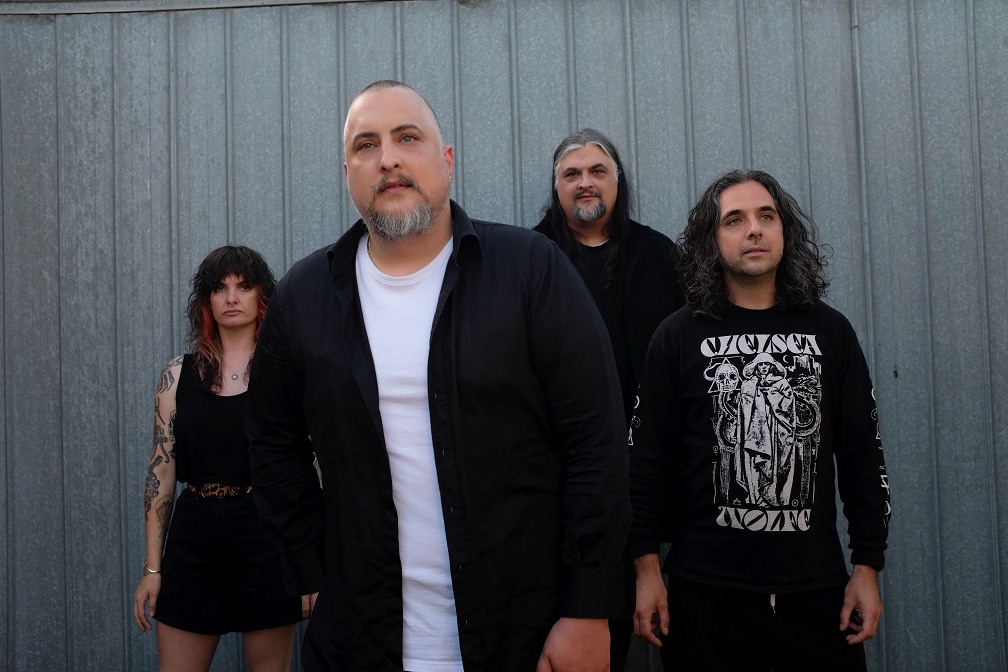Congratulations on the upcoming release of Levitator! How does it feel to be sharing this deeply personal album with the world?
Jim: Like a deep cosmic sigh of relief. This album has been through global pandemics, marriages, births, and deaths. The songs are snapshots of different periods in our lives, and they represent so much of our personal growth, as well as our growth as a band. It’s been a long journey, and it feels nice to finally unleash it on people’s ears.
Your sound has been compared to legends like Nick Cave and Tom Waits. How do these influences shape your music, and how do you make it uniquely your own?
Jim: I think what really stands out about artists like Tom Waits and Nick Cave is their individuality and the sense of weirdness they bring to their music. It’s ingrained in everything they do, and their authenticity is key. Take Tom Waits, he can hear a metal stool being scraped across a studio floor and immediately recognise it as something musical. That kind of freedom in thinking allows them to push boundaries too. We aim to make music that’s grounded in rock and roll but with a few weird, unexpected edges.
This album was created during a period of grief and transition for the band. How did that experience influence the themes and energy of the songs?
Jim: I’m writing this on the anniversary of Yianni and I’s father passing, so this question hits a bit harder than it usually would. But that’s the way grief works, it never really goes away, it comes in waves, and you learn to cope with it. It paints your perspective of things going forward and you start to appreciate things you might’ve taken for granted before. Some of the songs came from the very depth of it, when it was still raw and painful and that’s reflected in the confusion, the anger. And then as you move forward you see colour in the world again, and without consciously realising that we were setting that feeling to music in the album, the way it begins is very dark and minimalist and then ends on a note of optimism.
The lead single, ‘God Mode,’ and tracks like ‘Dance The Evil’ and ‘Well of Wishes’ showcase a range of moods and styles. How did you approach creating such a dynamic tracklist?
Jim: The easy answer is, we didn’t! We’d been living with these songs for so long that we all had our own ideas about how the album should flow. So, we got together and played the album this way and that way, front to back, back to front, and then our manager proposed a tracklisting, and it just worked. It was like that scene in Some Kind of Monster where the therapist hands Metallica their lyrics, only this time, it actually worked.
Lindsay Gravina has worked with some iconic artists. What was it like collaborating with him, and what did he bring to the production process?
Jim: He was integral in helping us cement the sound we’d been hearing in our heads. We were all familiar with his work with Magic Dirt and Rowland S Howard but his level of collaboration in getting the right sound for a track was second to none. Plus, after years and years working together, only towards the end, did I ever see him drink water. We’d work pretty much exclusively at night. I showed him the trailer for the new Nosferatu movie and he smiled and said it looked like a nice documentary.
The name Levitator feels symbolic. What inspired the title, and how does it tie into the album’s overarching themes?
Yianni: In a way, the whole album is about navigating tension, between light and dark, grief and healing, confusion and clarity, and Levitator became the perfect metaphor for that space where you’re caught between the earth and the sky. It’s about finding balance in the turmoil, or at least a way to keep moving, even when it feels impossible. The title Levitator felt big and epic enough to carry the weight of that journey. And I think Dodecahedron was already reserved for Liam Gallagher.
Your lyrics often explore raw emotions and introspection. What’s the process for crafting such honest, poetic songs?
Yianni: I have a lot of personal meltdowns.
Society of Beggars has built a strong reputation for its live performances. How does your approach to playing live influence your songwriting or recording process?
Yianni: When we play live, whether it’s an incredible night or a rough one, whether you’re with us or not, we give everything we have. We’re loud, heavy, and emotional. We bring that same energy into the studio. We don’t hide behind artifice or gimmicks. We’re not pretending to be something we’re not. We’re not trying to be “bogan rock” or “yacht rock,” or any other persona. We are who we are, and that’s what you get.
Rock music has evolved significantly over the years. How do you see your place in the current rock landscape, and what do you hope to bring to the genre?
Yianni: Rock and roll is a spirit. For those of us who still find comfort in it and are captivated by it, there’s a responsibility to ask: what does it mean in 2024? Is it just about macho bullshit? Or longing for the days of yesteryear? I really hope not. I hope it’s about people making music that’s not afraid to be vulnerable, intense and honest.
With the album release on the horizon, what’s next for the band? Are there plans for tours, music videos, or new projects?
Yianni: We’ve got plans for all three. We’ll be hitting the road soon, shooting a new music video, and keeping the creative fire burning on for whatever comes next.
Spotify Link: https://open.spotify.
Instagram: www.instagram.com/
